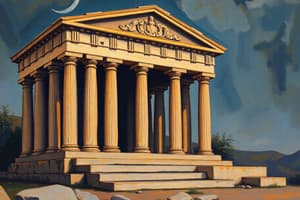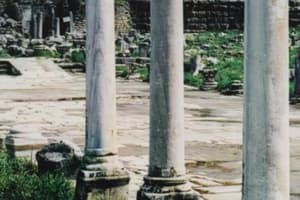Podcast
Questions and Answers
What was a key characteristic of the art during the Archaic period?
What was a key characteristic of the art during the Archaic period?
- Focused on young, nude, smiling figures. (correct)
- Depicted idealized forms of gods.
- Created lifelike representations of everyday life.
- Emphasized intricate facial details.
How did Classical art differ from earlier Greek art?
How did Classical art differ from earlier Greek art?
- It aimed for ideals of beauty, harmony, and proportion. (correct)
- It lacked any depiction of the human figure.
- It was more simplified and abstract.
- It exclusively featured religious themes.
What was a notable feature of the Hellenistic Period in art?
What was a notable feature of the Hellenistic Period in art?
- Focus on religious symbolism and divine figures.
- Depiction of individual types of people and realism. (correct)
- Emphasis on uniformity across artistic works.
- Simplistic forms that lacked emotion.
What significant change occurred in the purpose of art during the Hellenistic Period?
What significant change occurred in the purpose of art during the Hellenistic Period?
Which of the following best describes the evolution of sculptural portrayal in Classical art?
Which of the following best describes the evolution of sculptural portrayal in Classical art?
What period came after the Classical Period, characterized by a focus on movement and emotional expression in art?
What period came after the Classical Period, characterized by a focus on movement and emotional expression in art?
Which aspect was NOT a defining feature of art from the Classical Period?
Which aspect was NOT a defining feature of art from the Classical Period?
What development in the portrayal of subjects occurred during the Hellenistic Period?
What development in the portrayal of subjects occurred during the Hellenistic Period?
What characteristic of the Geometric period in vase decoration exemplifies the evolution of artistic representation?
What characteristic of the Geometric period in vase decoration exemplifies the evolution of artistic representation?
Which artistic development indicates a shift toward greater complexity in the depiction of figures during the Geometric period?
Which artistic development indicates a shift toward greater complexity in the depiction of figures during the Geometric period?
Which type of sculpture emerged in the Archaic period indicative of the evolution of artistic styles?
Which type of sculpture emerged in the Archaic period indicative of the evolution of artistic styles?
What was a primary reason for the creation of kouros and kore figures during the Archaic period?
What was a primary reason for the creation of kouros and kore figures during the Archaic period?
How did the style of the Discobolos by Myron contribute to the representation of athletic ideals?
How did the style of the Discobolos by Myron contribute to the representation of athletic ideals?
What innovation in pottery style marks a transition in the artistic approach during the Geometric period?
What innovation in pottery style marks a transition in the artistic approach during the Geometric period?
Which factor significantly influenced artistic styles during the Geometric period?
Which factor significantly influenced artistic styles during the Geometric period?
What aspect of the kouros sculpture represents a departure from earlier artistic traditions?
What aspect of the kouros sculpture represents a departure from earlier artistic traditions?
What is a notable characteristic of architecture during the Archaic period in Ancient Greece?
What is a notable characteristic of architecture during the Archaic period in Ancient Greece?
Which architectural style began to emerge in Ancient Greece during the Classical period?
Which architectural style began to emerge in Ancient Greece during the Classical period?
How did the Geometric period influence pottery design in Ancient Greece?
How did the Geometric period influence pottery design in Ancient Greece?
What did the introduction of realistic depictions during the Archaic period signify for Ancient Greek art?
What did the introduction of realistic depictions during the Archaic period signify for Ancient Greek art?
Which column style, characterized by simple and sturdy design, is associated with Classical Greek architecture?
Which column style, characterized by simple and sturdy design, is associated with Classical Greek architecture?
What architectural feature is most associated with the Hellenistic period in Ancient Greece?
What architectural feature is most associated with the Hellenistic period in Ancient Greece?
Which aspect of Ancient Greek architecture was primarily developed during the Classical period?
Which aspect of Ancient Greek architecture was primarily developed during the Classical period?
The term 'Hellenistic' refers to which phase in Ancient Greece?
The term 'Hellenistic' refers to which phase in Ancient Greece?
Flashcards
Archaic Period Statues
Archaic Period Statues
Kouros (male) and kore (female) statues from the Archaic period, depicting young, nude, smiling figures.
Classical Period Art
Classical Period Art
Greek art from approximately 500 B.C. emphasizing beauty, harmony, proportion, and human figures.
Classical Period Wars
Classical Period Wars
Sparta and Athens fought during the Classical Period.
Hellenistic Period
Hellenistic Period
Signup and view all the flashcards
Realism in Art
Realism in Art
Signup and view all the flashcards
Hellenistic Art
Hellenistic Art
Signup and view all the flashcards
Art Purpose Change
Art Purpose Change
Signup and view all the flashcards
Greek Culture Spread
Greek Culture Spread
Signup and view all the flashcards
Classical Period in Greece
Classical Period in Greece
Signup and view all the flashcards
Geometric Period
Geometric Period
Signup and view all the flashcards
Archaic Period
Archaic Period
Signup and view all the flashcards
Ancient Greece
Ancient Greece
Signup and view all the flashcards
Neolithic Period
Neolithic Period
Signup and view all the flashcards
Athenian Democracy
Athenian Democracy
Signup and view all the flashcards
Dark Ages (Greece)
Dark Ages (Greece)
Signup and view all the flashcards
Timeline of Ancient Greece
Timeline of Ancient Greece
Signup and view all the flashcards
Geometric Period Pottery
Geometric Period Pottery
Signup and view all the flashcards
Subject Matter in Pottery
Subject Matter in Pottery
Signup and view all the flashcards
Archaic Period Kouros
Archaic Period Kouros
Signup and view all the flashcards
Development in Geometric Style
Development in Geometric Style
Signup and view all the flashcards
Discobolos Sculpture
Discobolos Sculpture
Signup and view all the flashcards
Three-Dimensional Depth in Painting
Three-Dimensional Depth in Painting
Signup and view all the flashcards
Colour Use in Vase Paintings
Colour Use in Vase Paintings
Signup and view all the flashcards
Figurative Representation
Figurative Representation
Signup and view all the flashcards
Study Notes
Ancient Greece - A Struggle Between Myth and Logic
- Timeline: Neolithic (6000-2900 BC) to the Greco-Roman period (146-30 BC). Key periods include: Neolithic, Early Bronze, Minoan, Mycenaean, Dark Ages, Geometric, Archaic, Classical, Hellenistic, and Late Hellenistic/Greco-Roman. Specific dates are provided for each period.
Background
- Ancient Greece: Chronology from the Neolithic period to approximately 500 BC.
- Periods: Geometric, Archaic, Classical, and Hellenistic periods are documented and preserved.
- Archaic Period (800-508 BC): Greek civilization began, rise of city-states (e.g., Athens, Sparta), Olympic Games, and exploration of philosophy and theatre.
- Classical Period: Athenian democracy, philosophers (Socrates, Plato), and the Peloponnesian War (Sparta vs. Athens).
- Hellenistic Period (end of Alexander the Great to 31 BC): Decline of Greek power, conquered by Rome.
Characteristics of Art in the Periods
- Geometric Period: Pottery decoration includes geometric shapes; art depicted humans and animals. Simple, geometric forms.
- Archaic Period: Realistic depictions of humans; monumental stone sculptures (kouros and kore).
- Classical Period: Idealized beauty, harmony, proportion; human figures, everyday life; interest in representing facial features and body language.
- Hellenistic Period: Melodramatic subject matter; emotional portrayal, interest in individual emotions. Emphasis shifts from religious to aesthetic.
Greek Life and Beliefs
- Greek Gods: Anthropomorphic, represent natural forces; twelve main gods with specific domains and personalities; relationship with humans based on exchange.
- Religion: Practices originated in the Bronze Age; ceremonies at sanctuaries (temples); animal sacrifices and offerings.
- Afterlife: Believed in an Underworld ruled by Hades, Persephone, and Poseidon; immortality depended on remembrance by the living.
Examples of Greek Artworks (Geometric Period, Dipylon Vase)
- Functional Objects: Vases used for storage, carrying, mixing, drinking, serving, and cosmetics, etc.
- Decorative Elements: Terracotta (fired clay) vases, with various shapes, sizes, and intricate decorations.
- Correlations with Intended Function: Vase shapes often corresponded to their intended use.
- Figurative Representations: Geometric patterns, scenes of daily life (processions, war), and funeral scenes.
The Archaic Period, Kouros of Tenea
- Early Sculpture: Freestanding statues of nude young men (kouros) and clothed women (kore).
- Idealistic Representations: Portrayed ideal human form, youthfulness, and vigour, reflecting societal values.
- Influence of Egyptian Style: Strong similarities regarding the rigid pose and anatomical representations (symmetry, body proportions).
- Naturalistic Approach: Shifting from earlier styles towards a more realistic representation seen in the Kouros of Tenea.
Classical Sculpture, Discobolos
- Naturalistic Art: Portrays realistic human action (e.g., the Discus Thrower) – ideal representation of a moment in time.
- Idealized Representation of Athletes: Focused on athletes as physical ideals (athleticism).
- Compositional Effects: Employ rhythmic movement and balance to represent a moment in the action and show the ideal of human strength.
The Hellenistic Period, Laocoön
- Emotional Expression: Hellenistic sculpture contrasted with the calm harmony of Classical statues; emphasized emotional intensity and suffering.
- Group Sculpture (Laocoön): Three figures entangled in serpents; emphasized the heroic but tragic struggle.
- Emotional and Exaggerated Representations: Portrayed themes of suffering and confrontation with divine powers.
- Transition to the Roman Empire: Foundational work for Roman art as well, signifying dramatic decline of Greek culture.
Studying That Suits You
Use AI to generate personalized quizzes and flashcards to suit your learning preferences.




